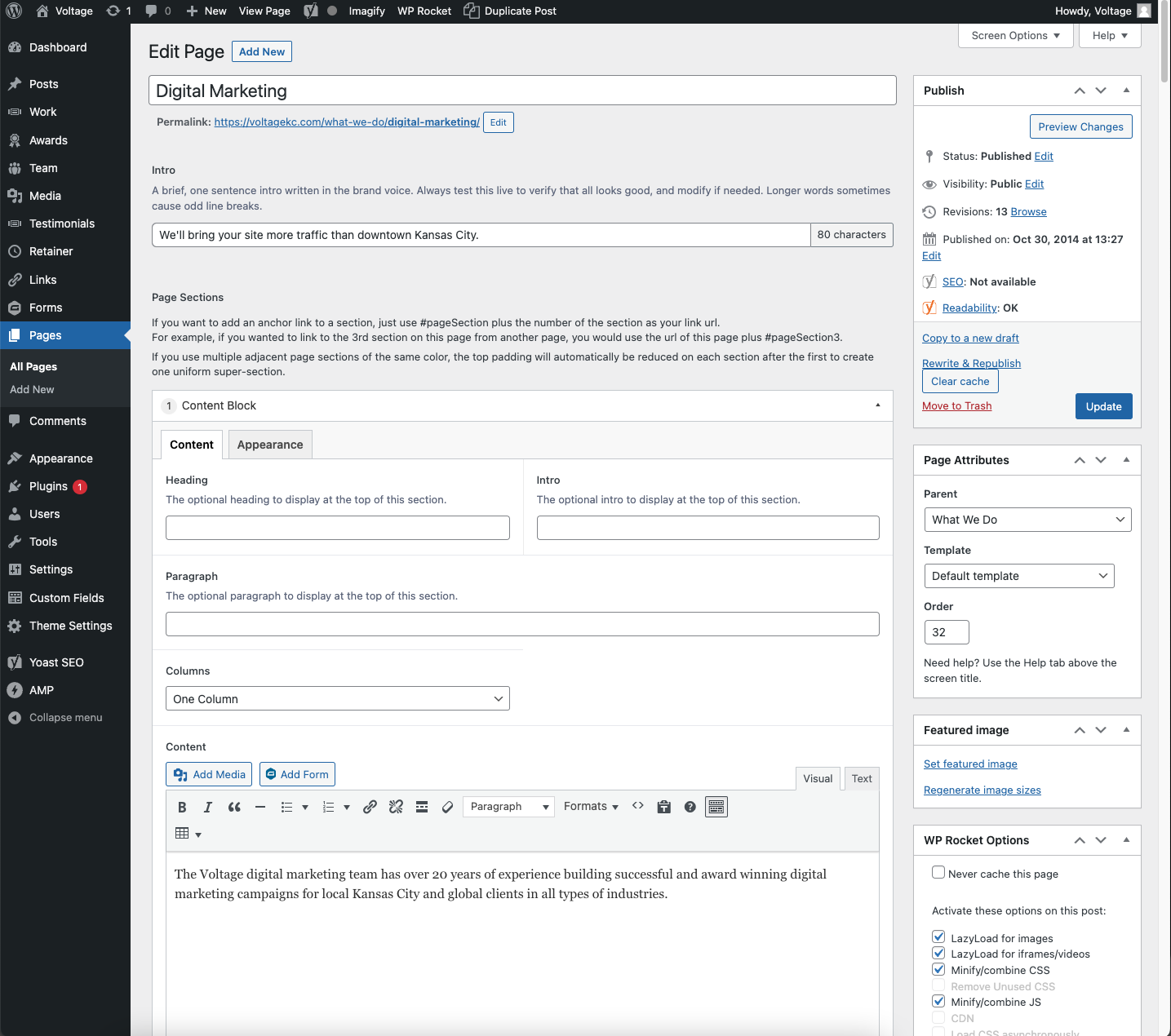If you’re new to the web, in a digital role, or are modernizing your business’ presence online, you likely hear a lot of acronyms and jargon.
Content management systems (or CMS) are talked about often and have become a standard aspect of most websites.
I’ve been working in the digital space since the early days of content management – and even before it was standard practice to have it – so I’m excited to share the details based on where we are in current times.
In this article, I’ll unpack what a CMS is, its importance, how they work, the different types content management systems, and how to consider the best options for you.
What Is A CMS?
A content management system is a functionality that allows administrative users to update, maintain, create, and manage their own content without having to get into the code or have a developer do it for them.
Usually, to access the CMS functionality, admin users will have a private login page or area to authenticate and navigate to a separate menu or portal that has options for the specific content that can be edited.
There are a number of types of CMS platforms and ways that this can look. I’ll get into some of the best systems for your consideration later.
No matter how custom or standardized the system is or how limited or robust, the ability to administer your site and have control over content without coding is powerful and can be crucial in how you manage your web presence.
Why Is A CMS Important?
A content management system is a powerful thing that saves time, money, and effort when it comes to being able to add and update text, images, videos, pages, and important page elements and structure to your website.
It’s essential that you are able to edit everything you need within your website.
Even in corporate environments or industries that require compliance reviews, approvals, and other steps for specific content before it goes live, a CMS can be very helpful with those steps built in.
How Does A CMS Work?
At the highest level, a CMS works by giving you the power to influence the live content on your site through editor boxes, upload options, and other behind-the-scenes features.
When you edit text, you’ll do so in an editor box that often has functionality similar to a program like Microsoft Word. Some systems have more controls and options than others.
Whether you’re editing text, uploading images, or creating pages, you’re doing so through user-friendly controls in the admin that make edits in the site databases and allow you to publish them to the live site.
This takes the place of having a web developer make the edits directly in the code.
In some cases, if you don’t have the controls you want or need, you can have them added by your developer or the platform itself.
In other cases, you might experience limitations of the CMS and may need to look at other options to land on the right platform for your site overall.
 Screenshot from WordPress, October 2022
Screenshot from WordPress, October 2022How Many Types Of Content Management Systems Are There?
Types of content management systems include:
- Content websites.
- Blog-focused.
- E-commerce & shopping cart.
- Non-profit.
- Industry-specific & specific functionality focused (e.g., donations, ticketing, customer portals, etc.).
- Online learning & development.
- Open-source.
- Proprietary.
- Custom-built & functionality.
Depending on what types of content you want your site to feature, what level of security you need, how integrated your site needs to be with back-end systems for fulfillment or customer access (e.g., online banking), or how flexible you want the content you manage to be, you have options for finding the right technology and CMS platform.
Additionally, there are content management systems based on open-source technologies or platforms (WordPress, Drupal, etc.), those that are built on closed platforms or SaaS-based products (Shopify, Wix, Squarespace, etc.), and opportunities to have your own custom CMS built.
Popular Content Management Systems
Content management systems are in use by approximately 796 million websites.
The top 10 CMS by market share globally includes:
Note that roughly two-thirds of all websites utilize a CMS.
This alone should validate the importance of a CMS for so many businesses and organizations around the world.
CMS Features
There are a number of specific content management features that are big reasons why CMS are so valuable, including:
- Create pages.
- Manage navigation.
- Edit text.
- Upload and manage images.
- Upload and manage video content.
- Manage product information.
- Contact forms.
- Blog content.
- Style and theme management.
- Analytics and reporting tools.
- Dashboards.
- SEO and marketing tools.
- Integrations.
- Content staging.
- Approval processes.
- Private content.
- Third-party security and support.
There are many more as well.
Depending on what the biggest priorities are for your content management needs and the custom nature of those needs, you may prioritize some factors over others.
Should You Build A CMS From Scratch Or Use A Popular System?
Twenty-plus years ago, your options would have been limited, and you would have likely been looking at a custom CMS as your best (or only) option.
The explosion of options and adoption rate of content management systems has shifted the decision from “if” to “what type” when CMS planning.
In many cases, an open-source CMS is best for content sites, shopping sites, and those that don’t have an unusual level of customization needed.
Even open-source CMS can provide a lot of options to customize through plugins or custom code to create features, functionality, and integrations needed.
However, if you have a very unique product, service, or web-based application, you may be best suited to create a custom CMS.
Reasons may include a lack of the necessary open-source technology in existence, unique integration needs, unique customer or user features, or the need to limit access and have closed systems for security reasons.
Challenges That Companies Face With CMS
CMS of all types (like pretty much all websites or web-connected interfaces) require specific oversight and action to maintain a secure site.
Custom code and CMS can have code and database risks if not updated and maintained to stay ahead of any known vulnerabilities.
Open-source CMS can have similar exposure with outdated CMS cores, plugins, and versions, and without proper monitoring to ensure versions are up to date and patched immediately when possible.
Beyond security, there’s also the potential challenge of having too many plugins, extensions, or add-ons to manage properly. Changing a setting in one plugin can break something elsewhere on the site, for example.
It can be challenging to properly QA and manage plugins and third-party aspects of a CMS.
Additionally, it can sometimes be difficult to scale on a CMS. Often, building a new feature requires removing old plugins and code and rebuilding – or risking having conflicts and not being able to fully get something to work as desired.
The Best Content Management System
It is hard for me to objectively tell you what the best CMS is.
As I noted earlier, the goal, and my desire for you, is to find the best one for your online presence and content needs.
The most popular CMS in the world is WordPress. It happens to be my favorite and the primary technology that my team uses to build websites, so you can note that if you disagree or think I’m biased.
What we have found with WordPress is that it is robust enough to do nearly anything we need.
Yet, it is user-friendly, allows for doing all the SEO optimization we need within it, and can be integrated with a wide range of other technologies. It has a higher ceiling than platforms like Squarespace, Wix, and more basic content management systems.
However, there’s a place for lighter-weight systems – much like there is a place for more enterprise and heavier systems.
While WordPress is great for ecommerce with WooCommerce, there’s a case to be made for some companies to be on another ecommerce CMS, like Magento, or a lighter/easier-to-onboard platform like Shopify.
Again, the “best” CMS is subjective. You’ll want to determine the right fit in terms of features, functionality, scalability, ease of use, and cost for you and your digital presence needs.
Ultimately, you need to weigh specific factors related to your situation:
- How well the CMS is supported/updated (for open-source or how you will handle for custom).
- The number of plugins or extensions available and/or that you need to manage.
- Hosted vs. self-hosted.
- The cost of licenses, hosting, management, and overall ongoing maintenance, both in the short-term and ongoing.
- Your ultimate goals and return on investment that the site can provide.
- Opportunities and limitations for SEO, marketing, customization, and scaling by specific systems.
- Other unique aspects related to your business or organization.
The Best CMS For Marketing
When it comes to marketing–if you’re doing any type of digital marketing, you need to make sure that the CMS you select can support your campaigns.
Questions to ask include: How easy is it to create landing pages with this CMS? To integrate conversion and event tracking? To implement analytics? To do technical and on-page SEO?
If any of those things are important to you, then be careful and select a platform that doesn’t limit you.
For example, I often encounter clients frustrated by limits on the simpler content management systems who end up having to reinvest in a new site and platform (e.g., moving from Squarespace to WordPress).
This is what can happen when you don’t think far enough ahead or ask the right questions in advance before fully building out a site on a specific platform.
Conclusion
Understanding how content management systems work, why they are important for your business, and how to choose the right one for your business needs is very important.
It can be time-consuming and costly to change platforms after establishing your site and content.
I recommend going through a thorough process to determine which is right for you, and thinking both short and long-term, so you make the best investment and decision for your business.
More resources:
- Traditional vs. Headless CMS: Digital Evolution And Content Velocity
- Decoded Headless CMS & SEO
- Perfectly Optimized Content From Start To Finish
Featured Image: Zoomik/Shutterstock




